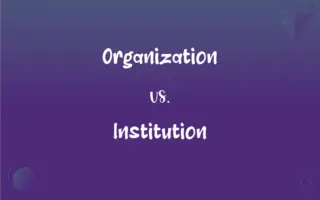Award vs. Reward: What's the Difference?
Edited by Aimie Carlson || By Harlon Moss || Updated on October 23, 2023
An award is a formal recognition of someone's achievement, while a reward is something given in return for one's effort or behavior.

Key Differences
An award typically signifies recognition for excellence, achievement, or a specific accomplishment. On the other hand, a reward is generally given in response to one's actions, behavior, or efforts and can be more transactional in nature.
In the world of arts and sciences, individuals might receive an award for their outstanding contributions or breakthroughs. In contrast, a reward might be given to an employee for meeting their monthly targets or to a child for good behavior.
Awards often come in the form of trophies, certificates, or titles. These are symbols that represent honor and recognition from peers or institutions. Rewards, however, range widely from monetary incentives to gifts, perks, or even simple praises.
When one wins an award, it often gets public acknowledgment, elevating their status or reputation in a community or industry. Rewards, although they can be public, are often private or personal, meant to motivate or encourage future positive actions or behaviors.
It's noteworthy that while all awards can be rewards (because they offer a form of gratification), not all rewards qualify as awards. A bonus given for work well done is a reward, but it isn't necessarily an award unless it represents formal recognition.
ADVERTISEMENT
Comparison Chart
Nature
Formal recognition
Given for effort or behavior
Examples
Trophies, certificates, titles
Money, gifts, perks, praises
Public vs. Private
Often public
Can be public or private
Purpose
To honor and recognize excellence
To motivate or encourage specific behaviors
Scope
Specific achievements or contributions
Broad range of actions or behaviors
ADVERTISEMENT
Award and Reward Definitions
Award
It signifies outstanding accomplishments.
The film won several awards at the international festival.
Reward
Rewards can be monetary or non-monetary.
She got a reward of a vacation trip for her ten years of service.
Award
An award is a formal recognition of excellence.
She received an award for her groundbreaking research.
Reward
A reward is a return for one's actions or behavior.
He got a reward for his diligent work on the project.
Award
Awards are often associated with competitions or contests.
The first-place award went to the innovative design team.
Reward
It serves as an incentive or motivation.
The company offered rewards to boost employee performance.
Award
Awards elevate one's reputation or status.
His literary award established him as a leading author in his genre.
Reward
They can be spontaneous or planned.
The unexpected reward for his helpfulness made his day.
Award
They can be symbolic, like trophies or titles.
The 'Employee of the Year' award is a coveted title in our company.
Reward
Rewards aim to encourage specific future actions.
To promote customer loyalty, the store introduced a reward program.
Award
To grant as merited or due
Awarded prizes to the winners.
Reward
A consequence that happens to someone as a result of worthy or unworthy behavior
The rewards of exercise.
The rewards of lying to your boss.
Award
To grant an amount or other benefit legally due
Awarded damages to the plaintiff.
Reward
Money offered or given for some special service, such as the return of a lost article or the capture of a criminal.
FAQs
Do awards always come with monetary benefits?
No, awards might be symbolic, like trophies or titles, without monetary value.
Why are rewards given in the workplace?
Rewards are often given to motivate employees and acknowledge their contributions or efforts.
Can someone get an award without competing?
Yes, awards can be given for lifetime achievements or contributions without specific competition.
How is a reward different from an award?
A reward is something given for effort or behavior, while an award is formal recognition.
Can a reward also be an award?
Yes, if a reward serves as a formal acknowledgment of excellence, it can be considered an award.
Are all awards publicly announced?
While many awards are public, some can be private or within a specific community or organization.
Can rewards be non-materialistic?
Yes, rewards can be non-materialistic, like praise, appreciation, or recognition.
How does an award impact a professional's career?
An award can enhance a professional's reputation, credibility, and opportunities in their field.
Is there always a tangible item associated with rewards?
No, rewards can be intangible like a compliment, recognition, or a simple thank you.
What's the significance of awards in the arts industry?
Awards in the arts, like the Oscars, recognize excellence and influence industry standards and trends.
Can rewards be spontaneous?
Yes, rewards can be spontaneous, given without prior notice or expectation.
Are there international awards recognized globally?
Yes, some awards, like the Nobel Prize, are internationally recognized and hold global significance.
What might be a common reward for children?
Common rewards for children include treats, toys, or extra playtime.
What is the aim of a reward system in a company?
The aim is often to motivate employees, foster loyalty, and promote desired behaviors or outcomes.
Is there a hierarchy in awards, like levels of importance?
Yes, in many fields, there are tiers of awards, ranging from local recognitions to prestigious international honors.
Can an award be taken back?
In rare cases, awards can be revoked if terms are violated or new information emerges.
Who decides the rewards in a corporate setting?
Rewards are typically decided by management, HR, or specific committees, based on set criteria.
Is receiving multiple awards indicative of consistent excellence?
While multiple awards often indicate consistent excellence, the quality and significance of each award also matter.
What is an award?
An award is a formal recognition of someone's excellence or achievements.
How can rewards influence behavior?
Rewards reinforce positive behavior, encouraging individuals to repeat or increase those behaviors.
About Author
Written by
Harlon MossHarlon is a seasoned quality moderator and accomplished content writer for Difference Wiki. An alumnus of the prestigious University of California, he earned his degree in Computer Science. Leveraging his academic background, Harlon brings a meticulous and informed perspective to his work, ensuring content accuracy and excellence.
Edited by
Aimie CarlsonAimie Carlson, holding a master's degree in English literature, is a fervent English language enthusiast. She lends her writing talents to Difference Wiki, a prominent website that specializes in comparisons, offering readers insightful analyses that both captivate and inform.































































